Peter MALONE
In the Same Breath
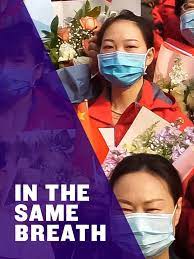
IN THE SAME BREATH
US, 2021, 95 minutes, Colour.
Directed by Nanfu Wang.
During 2021, documentary filmmakers produced feature length films exploring the background of the coronavirus epidemic. This is one of the earliest documentaries – and worth seeing, as it goes back into Chinese origins and initial American reactions in 2020.
The director was born in China, journalist, moving to the United States, starting a family, making documentaries on the US. She returned to China for a visit with her husband and son early in 2020, went back to the US just as news of the epidemic was revealed. While she looked on from the United States, she made contact with a number of friends in China, urging them to film as much as possible, in any way possible and get the material to her. She has drawn on a vast amount of footage to illustrate the history of Covid 19 in 2020 China.
She comes back to the New Year’s Day announcement that eight doctors were being punished for rumours about a virus. She then develops the gradual stages during January, the emergence of illness, the deaths, hospital crises, the government admission that there was an epidemic, but the firm government restrictions on what news could be announced, with various sequences of newsreaders repeating the government line on what was happening with the epidemic, sequences in Wuhan, details of hospital crowding, illness and deaths, and revelations about the number of deaths, burials and cremations.
All the time, there are speeches from the president, huge party rallies, the singing of the national anthem by an enormous range of singers, interviews with local people who believe that the government had done its best to protect them during the pandemic.
In the meantime, the director also chronicles the initial American hesitations, the early protests demanding freedoms, quotations from Donald Trump and other leaders, playing down the pandemic, initial cases in New York City, then the gradual spread, the repetition of illness, hospital crowding, deaths.
The director makes the important contrast between reactions of the strictly controlled Chinese media response, the restriction of information and facts, compared with the reactions of protesters and freedoms in the United States, out in the streets, placards and yelling, violent promotion of “our” rights – but both systems succumbing to large numbers of infected.
While the film offers some revelation into the Chinese experience, a great deal of local sequences, including information that correspondents were arrested and punished, interviews with ordinary people both critical of the government and supportive, the contrast with the US reaction is strong. And the question of which system benefits its citizens more.
Don't Go
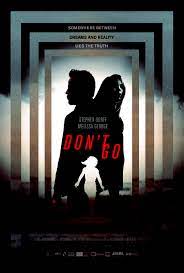
DON'T GO
And, 2018, 91 minutes, Colour.
Stephen Dorff, Melissa George, Simon Delaney, Aoibhinn McGinnitty, Grace Farrell, Gavin O'Connor, Lalor Roddy.
Directed by David Gleeson.
An Irish story with echoes of the supernatural.
Stephen Dorff and Melissa George portray a couple who have lost their daughter in a beach accident. They moved to the Irish countryside, he an author, she something of an entrepreneur for tourism and hotels.
He has recurring dreams, going to sleep on the beach, each dream adding to the other, the narrative of the dreams lengthening, the parents playing with their daughter on the beach, building a sand castle, putting flags on the Castle… Each time the dream extends, the father is more anxious, but finds when he awakes, he has ever more flags.
The couple settle into the Irish town, especially helped by a very lively priest (Simon Delaney).
There is also a visit from a friend, a revelation that the father has had an affair with her, the mystery developing and the death of the friend.
There is tension between husband and wife – and the hope that time moves in a circle and that the sadness of the past can be rectified. But, as with some science fiction (like Archive), there is a twist of perspective at the end, altering what we have seen.
- The title? Grieving parents? Searching father? Dreams and memories of the dead child?
- The Irish setting, the seaside town, home, hotel, school? Pumps? The beach? The musical score?
- Ben and Hazel, their marriage, her being Irish, he American, their meeting, living in Ireland, his writing and publication, Hazel and her work, the hotel? The scene on the beach, building the sandcastle, the moat, the flags? Ben and his recurring dream, the lengthening of the memory, the mystery, rescuing Molly or not? His having the flags?
- Ben, his character, friendly, the death of his daughter, memories, having to cope, sleeping on the beach, the dreams, the lengthening story? Confiding in Hazel? Her reactions? His going to classes, teaching Macbeth, the insight and discerning our Lady Macbeth was pregnant, the death of the child? Signing the students book? Confiscating the drugs? Hazel and Serena finding them, smoking? The principal and to accusation, Ben resigning? Crashing the car? Appearing at the social the launch of the hotel?
- Hazel, her friend David, Ben’s suspicions, seeing them, David is a psychologist, then attacking him and throwing him out of the house?
- Ben, the discussions with the scientist, Stephen Hawking, time is relative, time coming round again, revisiting the past?
- The late revelation of Ben and Serena, Molly finding them, falling down the stairs and dying? Ben and his guilt? Serena, friends with Hazel, arriving again, trunk, hanging herself?
- The genial presence of Father Sean, size, his comments about his vocation, about Jesus on the cross? The mass of the chief students, genial responding to the heckler? Discussions with Ben, friendly, the quiz night, the invitation to poker, bending church, going to the house, discovering Serena?
- The hospital, the doctor, Ben and his tablets? Needing to sleep?
- The launch, the doctor on the launch, Molly and Hazel watching, Ben swimming, the drowning?
- The switch at the finale, Ben’s funeral? Altering the audience perspective? Time travel and different possibilities?
Don Juan de Marco
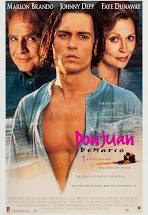
DON JUAN DE MARCO
US, 1995, 97 minutes, Colour.
Johnny Depp, Marlon Brando, Faye Dunaway, Bob Dishy, to Talisa Soto, Rachel Ticotin, Richard C. Sarafian.
Directed by Jeremy Leven.
Don Juan de Marco is not predictable. Johnny Depp is emerging as one of the most talented of young Hollywood actors. One thinks of Edward Scissorhands, What's Eating Gilbert Grape, Ed Wood, Dead Man. He is usually more than a touch melancholy as he is here. A young man, locked into his fantasy that he is Don Juan reincarnate, is treated by a psychiatrist, played in a more lively form than usual, by Marlon Brando. As the therapy sessions proceed, with the young man elaborating extraordinary stories, the psychiatrist must make a decision as to whether he should `cure' his patient or leave him happy in his world.
But the psychiatrist is affected by his patient, becoming much more affectionate to his devoted wife (Faye Dunaway). Improbable, but a light and often delightful film. A surprising pleasure.
- Title? The legendary Don Juan? Don one in the Americas?
- The blend of reality and fantasy? In the mind of John Arnold a Marco? In the mind of Dr Jack Mickler?
- The visualising of the fantasies, John and his Zorro costume and mask? The recreation of the past, the Hispanic families, the women, Don Juan and his career, the year on the island, relationships? Dr Jack Mickler as part of the fantasy?
- The contrast with Jack Mickler, a Marlon Brando character, his presence, bulk? Age and retirement? Relationship with his wife? His career, psychologist? His taking on John Arnold, the appeal of the case, possibilities for success?
- The presentation of the sessions, the interaction between the two men? The effect of the therapy on John, going back into his fantasies, becoming entrenched in his fantasies? The effect on Dr Jack? His entering into the fantasies? The challenge to bring John out of them?
- The portrait of the doctor’s wife, the relationship, their past, age, retirement? Affection? Love? Re-discovery?
- 10 days of the institution, the treatment, no medication? The effect on John? Drs decision whether to leave him happily in his fantasies or risk the sombre coming to reality and its effect on John?
Marjorie Prime
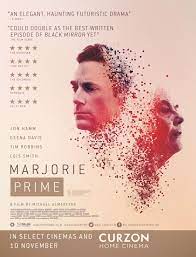
MARJORIE PRIME
US, 2017, 99 minutes, Colour.
Lois Smith, John Hamm, Geena Davis, Tim Robbins, Stephanie Andujar.
Directed by Michael Almeyreda.
Soon after the release of Marjorie Prime, there was a science-fiction, science-fantasy drama called Archive. The thrust of these films (with memories of Alex Garland’s Ex Machina) was preserving the memories of the dead. With Archive, a scientist was working with robotics, the retention of memories and incorporating them into the robot.
With Marjorie Prime, the means of preserving the memories of the dead is through holograms.
There are many conversations in this film, the preservation of memories and the opportunities to share them. In the central cast is expert at these conversations, especially actor and actress, Lois Smith, in one of her best roles, as an elderly grandmother involved in conversations with her deceased husband and with her daughter and son-in-law, but also then, in different mode, as a hologram for her daughter.
The daughter is played by Geena Davis, the son-in-law by Tim Robbins who is involved in the industry for holograms, and Jon Hamm is the deceased husband.
One has to be very attentive as to what is happening, where central characters are alive, when they die, when they become holograms. Which gives each of the cast an opportunity to vary their personalities as to when they are living persons and as to when they are holograms.
Intriguing. The was written and directed by Michael Almeyrada, responsible for a number of offbeat and small productions, including variations on Shakespeare’s Othello, Hamlet and Cymbeline.
- The title, the focus on Marjorie and her life? And the technology of holograms, the Primes?
- Based on a play? Theatrical treatment? Dialogue, long conversations? Confined spaces and situations? The effect? Intellectual attention? Audiences finding the conversations dull/boring?
- The audience taken off guard, Marjorie at 86, the presence of Water, the conversations, his age when proposing to Marjorie? The sharing of memories? Discussions? Testing what should be remembered? The revelation that he was a hologram?
- Futuristic science-fiction, science-fantasy? The work on producing holograms? The storage of memories? The description of memories – remembering the last memory, memory of memories, not the original memory?
- The plausibility of such hologram development? Its use?
- Marjorie and her story, violin player, meeting Walter, marrying, Tess, the memory of the children, of dogs and pets, funerals? Outliving her husband by years? The need for her to have a hologram? Her living with Tess, with John, her past disapproval of John? His working for the company and holograms? Her ordinary life, conversations at home, discussions about the hologram? Building up to her death?
- Tess and John, the relationship, Tess and the tormented memories of her relationship with her mother? Having the hologram of her mother, the conversations on memories, to testing of Tess?
- Julie, caring for Marjorie, getting caught up in the real and hologram controversies, being fired?
- The hologram of the very aged Walter? Tess seeing him?
- The succession of reality, holograms, more holograms? The dramatic impact, the searching for memories, altered memories?
The Bowraville Murders
I am Steve McQueen
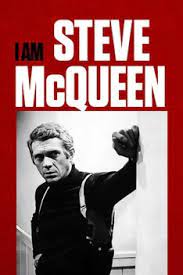
I AM STEVE MCQUEEN
US, 2014, 90 minutes, Colour.
Narrated by Robert Downey Jr.
Directed by Adrian Buitenhuis.
Response to this documentary will depend on how old the audience is. Steve McQueen died at the age of 50, born in 1930, died in 1980. He was a significant film star, emerging first on television, Wanted Dead or Alive, making quite an impact in the early 1960s with The Magnificent Seven and, then, The Great Escape. While clearly an action star, he impressed with his performances in The Cincinnati Kid, nomination for The Sand Pebbles, and The Thomas Crown Affair in the late 1960s. While he loved cars and speed, and his driving in Bullet is perpetual witness to this, but his film Le Mans was a commercial disappointment. However, he made a strong comeback dramatically with the Getaway, puppy on and in the blockbuster, Towering Inferno. He then withdrew from Hollywood, making only a few films, the last being Tom Horn, a Western.
Documentary covers all these films though sinners would have liked some comment on some of his more modest dramas like Love with the Proper Stranger and Baby, the Rain Must Fall.
Film critic Ben Mankieuwicz comments throughout the film on McQueen’s cinema career – with comments from associates, producers, martial arts trainers, stuntmen.
There is also commentary from Gary Oldman, Pierce Brosnan, stunt woman is the So we Bell. Their presence seems somewhat arbitrary although Pierce Brosnan starred in the remake of The Thomas Crown Affair.
So, fans will appreciate the overview. Those not familiar with the McQueen films may find it an opportunity to go back and view some of them.
The film also works on the level of a portrait of McQueen as the man, from the very difficult childhood, abandoned by parents, moving to orphanage, opened the possibilities of petty crime, having time in the Navy (and, with cleaning the boiler rooms for discipline imbibing asbestos which later killed him with cancer). He studied, found parts in television, then films. The word (rather irritatingly repeated and repeated) is “cool”. But the film also stresses that he was aggressively ambitious, a strong ego, short fuse, smart on how to keep the camera on him, annoying fellow actors, a rivalry with people like Paul Newman (and wanting equal number of lines to speak in The Towering Inferno), moving from big-budget action and doing his own stunts to some effective dramas.
The film highlights his hyper- action, of cars (and owning a wide range), driving fast, interested in competition, a love for and knowledge of mechanics.
There is also the witness of his three former wives, and his son, Chad, and some grandchildren. His son is incomplete admiration of his father. McQueen’s first wife calmly remembers meeting, courtship, marriage, children, family life, going on location to Taiwan for almost a year for The Sand Pebbles. And, it was the 60s. She does not excuse him but at the time of Le Mans, she left, her son having the option of where to live in staying with his father. Ali McGraw also gives a very interesting interview, explaining the situation with her marriage to Robert Evans of Paramount, working with McQueen in The Getaway, and not being confident, her comment about having been conspicuous for about five minutes, the difficult marriage, divorce. McQueen’s final what, Barbara Minty, the younger, seems to have been on McQueen’s wavelength and they got on well, the marriage cut short by his illness and death.
McQueen in fact has quite a cinema heritage – but whether he was someone one would like to meet in writing real life is another matter.
Unorthodox
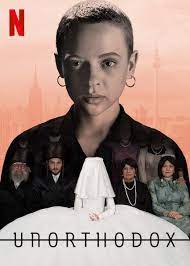
UNORTHODOX
US/Germany, 2020, 4X 55 minutes, Colour.
Shira Haas, Amit Rahav, Jeff Willbusch.
Directed by Maria Schrader.
Unorthodox is a four-part miniseries, filmed in New York and Berlin, principally in Yiddish. It is based on the biography by Deborah Feldman, Unorthodox, The Scandalous Rejection of My Hasidic Roots. It was very well received, nominated for many enemies, winning one for the Dir, Maria Schrader.
The central character is a young bride in the Sitmar group, originating from Hungary, of the ultra-Orthodox in Brooklyn. She lives a very sheltered life, dominated by her family, especially the older women. The women are sheltered in the community, even to cutting and covering their hair. She becomes betrothed to an earnest young man and marries him, finding the marriage and her life and fulfilling.
She escapes, goes to find her mother who had been rejected by the community and who now lives in Berlin. In Berlin she encounters a group of musicians, finds lodgings with them, some training, singing, some criticism within the group, in encounter with one of the members of the group.
In the meantime, her husband employs the help of his cousin, a man who had fled the community but has now returned and is zealous. He tracks down the wife in Berlin, confronts her, but she asserts her independence.
Israeli actress Shira Haas makes a strong impression as the wife.
- Based on a true story? New York, the world of the Orthodox Jews, ultra-Orthodox? Williamsburg? The contrast with Berlin?
- The women’s story, authentic, the writer of the original book, the perspectives of the director and producers, screenwriters? Performance? Women in Orthodox Jewish society, in New York City? This silent presence? Singing, the Talmud, the traditions? The presentation of New York City, Williamsburg, the streets, homes, the synagogue, interiors? The sets, decor and costumes? Stylised? The wedding? The authentic feel and detail?
- The contrast with Berlin, city, apartments, streets, theatre? The feel of the city, modern, the 21st-century?
- The intercutting of the stories, the present in the past, New York in Berlin? The dramatic effect?
- Esty’s story, her marriage to Yanky, her mother and the older generations, the women and their status, silent? The flashbacks to the courtship, the wedding, clothes, hair, head covered? The influence of the elders, the grandmother, the aunt? The women having no active part in society, wives and mothers?
- Esty’s mother, the past, departure, moving to Berlin, her work, her relationships? Providing the identity for Esty, Esty’s decision to leave, going to Berlin, her mother, the eventual meeting, her mother supporting her?
- The glimpse of the marriage, Yanky, earnest, the traditions? His upset at Esty’s leaving? His discussion with Moishe?
- Moishe, the rebel, wanting to restore order, his plan, going to Berlin, Yanky, the experiences in Berlin? Tracking down Esty?
- Esty, immersed in the Berlin world, meeting the people, music, her performance, acceptance, the training, the woman and her critique? Adapting to the new world? Friendship, sexual relationship? Adjusting?
- Moishe, Yanky, the meetings with Esty? Her decision to stay?
- The film as a portrayal as well as critique of ultraorthodox Judaism? And the subjugation of women?
Drone

DRONE
Canada, 2018, 91 minutes, Colour.
Sean Bean, Patrick Sabongui, Mary MacCormack, Maxwell Haynes, Joel David Moore.
Directed by Jason Bourque.
It is amazing and the presence of drones in our lives. They can become playthings. They can become weapons. So much photography for films is done by drones. I in the Sky was a British film critical of the work of drones in pursuing criminals in Africa.
The opening of the film has a drone strike. The film introduces the central character, Neal Whiston, played by Sean bean, who with a partner operates covert experiments, targeting drone attack in different countries, even to killing.
However, the main action takes place in house in Washington DC, the Whiston household, grieving the death of Neal’s father, Neal’s wife and his teenage son. They are to sell Neal’s father’s boat. A stranger walks past, comes in, offering to buy the boat, polite and friendly, even making suggestions to deal about the eulogy for his father. He stays for a meal.
Gradually, the truth is revealed. Is a husband and father of the victim seen in the initial drone strike in Pakistan. However, the CIA have been tracking him and are observing him in the house, keeping them under surveillance. Ultimately, there is a confrontation, Neal killing the man who is threatened a bomb in his briefcase – but, on opening, after his death, there is only the photo of his wife and daughter.
There is an unnecessary subplot indicating that the wife is having an affair with Neal’s partner, photographed by the grieving father.
However, the film is highly critical of such covert operations by the CA, the amoral stances, the secrecy – and the dire consequences.
- The title, the role of drones in contemporary society, in contemporary warfare?
- The Pakistani sequences, filmed in India? The cities, the people, homes, the drone targets, explosions? Deaths? The recurring flashbacks of the family?
- The Washington sequences, Neil and his companion, their work, targeting, the drones, the explosions, killing? The contrast with the suburban home, the boat, the interiors? The musical score?
- The Wistin family, the death of the grandfather, his reputation, Shane’s grief, the suggestion of the Viking ceremony and his fulfilling it? Neil and the preparation of the eulogy? Neil, the secrecy of his work, the CIA, his double life? Ellen, ethnology, cultural openness, life at home, the affair with Gary and her secrecy? Shane, at school, communication with his father?
- The information about Imir, the CIA and the profile? The CIA agents, tracking him, outside the Wistin house, surveillance, listening in?
- Imir, passing the house, seeing the boat, the conversation with Neil, the prospect of buying the boat, the invitation to come in, meeting Ellen, meeting Shane? Gentlemanly, his story, Pakistan, Oxford education? His looking through the house? His suggestions for the eulogy, the personal story, memories of the father? The deal? The invitation to stay, the meal and conversation?
- Neil and his drinking, the comments about Pakistan, the city, treating women like cattle? Imir and his reaction?
- Neil, the phone calls to Gary, the meetings for the next morning, hesitant on the phone, Gary and his arrival at the door, the discussions? Gary and his relationship with Ellen?
- Imir, the revelation about his family, the flashbacks, the threat of the bomb in the briefcase? The fight with Neil? The agents coming in? Neil stabbing him? The irony of the photos in the briefcase?
- The consequences for the family, not shown, Neil and his using of the case, whistleblowing? Shane in the boat with his father? For Ellen?
- The perceptions on the United States, CIA, the use of drones, targeting, amoral attitudes?
Safe/ Harlen Coben
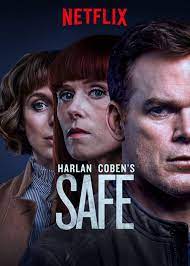
SAFE
UK, 2018, 8X 55, Colour.
Michael C.Hall, Amy James- Kelly, Amanda Abington, Freddie Thorpe, Marc Warren, Louis Greaterorex, Hannah Arteton, Isabel Allen, India Fowler, Raj Paul, Joplin Sibtain, Nigel Lindsay, Hero Fiennes Tiffin, Katie Carmichael, Audrey Fleurot.
Directed by Julia Ford, Daniel O 'Hara, Daniel Nettheim.
Harlan Coben is one of the most popular American crime writers. He has been publishing novels since 1991. His novel, Tell No One, was adapted for the screen, the action transferred to France.
In recent years, there have been quite a number of miniseries adaptations of Harlan Coben novels. Interestingly, they have not been made in the United States. Harlan Coben each series himself has acted as one of the executive producers of each series. They are adaptations of stand alone novels although one in production, is an adaptation of one of his Myron Bolitar stories Stay Close.
Devotees of the novels will have no difficulty in enjoying the series.
Safe has a British setting, a provincial city. As with other Harlan Coburn stories, the central character is a middle-aged man obsessed with the quest (The Stranger and a search for a lost wife, The Woods and the search for a lost sister). Here he is played by Dexter’s Michael C.Hall, obsessed with the disappearance of his daughter. Is a successful surgeon, living in a gated community, working with a friend from his student days, played by Marc Warren, who helps him in his search.
In a way, the action is quite localised, within the gated community in the homes of various members. There is also a club, Heaven, and its suspicious proprietor. There is also the indication of a mental institution.
As, with The Woods, there is a focus on teenagers, school, parties and celebrations, sex and drugs. And the sequences recur throughout the series. But, as revealed quite late in the series, but like The Woods, there is criminal activity from the past. And, the surgeon daughter discovers something of this and pursues her investigations.
Of course, there are various interested parties, individuals who want the past to be kept secret – leading to murders, fires, confrontations.
Which means that there are quite a lot of interesting character actors, especially the family where the body of the murdered young man is found in their pool and who try to cover up. There is another family where the wife is a teacher at school, accused of having an affair with a student, the mother of the dead young man.
And, there is the local detective, in a relationship with the surgeon, pursuing the leads with efficiency, getting a young detective as her assistant (who has her own story and some surprising revelations before the end).
For those who like tracking Harlan Coben’s plots and clues, the revelation of Safe is somewhat parallel to the solution of The Stranger.
Directors are Dennis O’Hara and Daniel Nettheim have been involved in several Harlan Coben series.
- The adaptation of a Harlan Coben novel? British setting? Characters?
- The effect of the miniseries, the eight episodes, exposition, situations, mystery, plots and subplots, intertwining, suspense, resolution?
- The setting of the British country city? Location photography, the streets, shops, churches? Police precincts? Homes, school? The countryside at night, during the day?
- The title? The father-daughter relationship? Complexities?
- The city, suburbs, homes, the gated precinct, neighbours living close, beyond the precinct? The club, school, police precincts? The world of doctors? Youth?
- Tom Delaney, doctor, age and experience, relationship with Rachel, their past, her illness, absent from her death, with Sophie? Jenny and the blame? Jenny’s disappearance, intense search, phone leads, the visit to the railway, the club, Heaven, the confrontation with Bob? Greater aggression? The relationship with Sophie continuing? Working with Pete, their long friendship, his help? Interviewing the young boys, the drugs, Pete being shot, in hospital, the revelation about his daughter and Tom knowing? Helen next door and the mystery? The note about Jasmine? Going to the institution, the intrusion, excluded? Going to the help Centre where Rachel worked? The young boy and following him? Eric and his place in the gated community?
- Sophie, relationship with Josh, separation, his living in the trailer in the grounds? Care for Henry, his illness? Her daughter, the bond with Tom’s daughter? Staying over? Her work with the police, investigations, her partners, working with Emma, the tension between them? The interrogations, the search for the body and its discovery, the clue with the family, interrogation, taking them in? The issue of Zoe and the complaints by the school principal? Having to communicate Chris’s death to his parents?
- The Marshall family, Jo Jo and his bravado, timid wife, the daughter, age, school, selling drugs, hosting the party, the phone call to her parents, discovering the body in the pool, disposing of the body, the freezer, the neighbour seeing the body, her hitting him over the head, the threats as a pervert, their being arrested, the father confessing, the times inaccurate, further charges, the release, the daughter, the jewellery box, the pendant, the revelation?
- Chris, at school, partying, drugs? Clash with his father, relationship with his mother? The demanding father? Zoe, at school, the accusations, the images, the suspects, in fact her relationship with one of the students, the confession by her husband that he planted the material? The news of Chris’s death? The memorial on the lawn? Jenny watching in secret? The consequences for the family, the daughter, husband and wife coming together?
- Pete, personality, doctor, friendship, gay, helping Tom, the blackmail episode, the drug dealers, his being shot, hospital, the encounter with Emma, her approaching him, her story, the truth? His pride in having a daughter?
- Emma, her story, pregnant, the death of her partner, reconciliation with her father, with Henry, the clashes with Sophie, the interview, his turn, going to hospital?
- Craig, in the Jasmine Institute, Eric as his father, the visits to Bobby? The truth?
- Bobby, Heaven, his staff, fear of him, his lies to Tom, going to Helen, murdering her, the house on fire? Wanting the tape? Jenny’s approach to him, sheltering her, the threats?
- The story from the past, the flashbacks, the revelation, the children, against the teacher, mischievous, the fire, the tape? Helen keeping the tape? Jenny staying with her? The fire? Bobby, the buildup to the confrontation, his suicide?
- Rachel, the truth, confiding to Jenny, wanting to tell her husband?
- Tom, the reconciliation with Jenny?
- The truth, Sophie, her motivations, murdering Chris, going to prison, the recapitulation of her behaviour and her crime?
Scandalous: the True Story of the National Enquirer
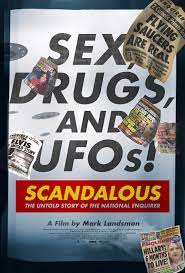
SCANDALOUS: THE TRUE STORY OF THE NATIONAL ENQUIRER
US, 2019, 97 minutes, Colour.
Directed by Mark Landsman.
The tabloid, The National Enquirer, has been frequently quoted history in the United States, well-known over several decades for its sensational stories, inflamed by sensationalist headlines, full of photos. Popular but highly criticised for its “tabloid” journalism.
For those not so familiar with The National Enquirer, this is a very interesting documentary, covering the history of the paper, the different phases in emphases during its lifetime, the influence of various editors and their stances. The film includes extensive footage of its founder, Generoso Pope, who inherited a New York paper from his father (Mafia connections), went to Florida, full of ambitions to produce a paper that would outsell all others. The film also interviews subsequent editor Steve Coz, editor during a significant phase in the 1990s. The paper, along with other papers and magazines was bought by American Media, headed by another ambitious proprietor, David Pecker, who took the paper in a different direction during the 2000s, significantly influenced by Donald Trump.
The film is interesting in that many of its talking heads, a significant number, are of journalists who worked for the Enquirer. They offer their points of view, devoted to the ethos of its journalism, telling stories of the pursuit of stories, such as the background of Bill Cosby and Bob Hope and their being suppressed by editorial, in fact building bonds between the two celebrities for positive interviews. A number of the journalists are interviewed in their old age, looking back over long careers, explaining how they were headhunted, the work, its significance, dirty tricks, some regrets, but still proud of their work. For each journalist, a working card comes up indicating their name as well as the years they worked for the paper, from the 70s to the 2000s. Some commentators on the film regret that it gives so much prominence to the journalists and their stances. However, it is interesting to look at them, listen to them, whether one approves of them or not.
There are some talking heads who are critical of the whole ethos of the paper. The principal of these is Carl Bernstein, famous for All the President’s Men.
The film explains that Gene Pope wanted to reach the ordinary American citizen, the housewife and mother of Kansas City Missouri, finding that placing the Enquirer near the checkout points at supermarkets commanded attention, curiosity, sales. He was very shrewd in assessing what really was of interest to the ordinary American. He liked to raise curiosity, resorting to outlandish narratives, secret photos… He died in 1988.
During the 1990s, the Enquirer had an opportunity to become more professional and even more respectable, especially in exploring significant cases. The Enquirer was crucial in proving that O.J. Simpson was lying during his trial, the Enquirer spending millions of dollars asking sports photographers to go through their files and identify Simpson wearing a pair of shoes which he had denied wearing. Their research was more effective than that of the police. There was backfire, getting photos of Princess Diana for many features, some published at the time of her death, and the Spencer family blaming the paparazzi, including The Enquirer, for hounding the Princess, her physical and mental condition, for her death.
The film is particularly interesting in view of its being released during Donald Trump’s presidency. The filmmakers are entirely unsympathetic, the film spending a lot of time featuring Trump, his relationships, sexual relationships, his narcissistic desire to be in the public eye, befriending David Pecker, and, by the time of the presidential campaign, relying on him, even feeding him stories anonymously, that would keep Trump in the public eye, those headlines at the supermarket checkout. (The film also shows a relationship with Arnold Schwarzenegger, underplaying his sexual behaviour over the decades, is divorce, at the time is campaign to be California Governor)
This is not an in-depth study of The National Enquirer and its impact – rather, within hundred minutes, it offers a survey of its history, alerting its audience to its various phases, offering sufficient grounds for a moral assessment.